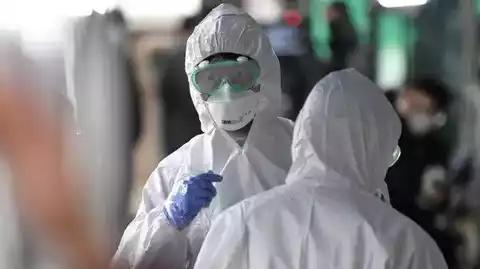Plateau State officials in Central Nigeria say they have screened 49 suspected cases of coronavirus in the State.
45 of the test results have returned negative, while others are still pending, said Mr. Danladi Atu, the Secretary to the State Government on Friday.
By the available test results, Plateau is free of the virus, Atu said in Jos, the capital of Plateau State while receiving private donations for the fight against the disease.
Between “suspected” and “confirmed” case
The economic shutdown caused by the coronavirus disease globally, and its high transmission rate have made it dreadful despite being less fatal that SARS, MERS, Ebola and even Cholera, especially in people under 70years and without any precondition. As such, people get apprehensive whenever they see a sign that they might be at risk of the disease. However, there is a big difference between confirmed and suspected cases.
Globally, there are tens of millions of suspected cases but the figures often released are only of confirmed cases. In Nigeria, over 4000 suspected cases have so far been screened according to official reports. However, only about 220 cases have been confirmed.
The reason the officials will not tell you who they have screened especially when such tests turn out negative is that it is of no consequence. We sieve grains for the pieces we can keep not for the chaff we can dispose. After all, being suspected means that they are thought to have it. And after being screened and found to be free, they are free indeed so why should anybody care? They are not of any threat to public health. It’s those that are confirmed that are often instantly quarantined and treated.
Where is testing done?
Nigeria presently has but four testing centers in Abuja, Lagos, Ibadan and Abakilike. So far, only the Lagos centre is believed to be more equipped and functional. However, all states are linked with the centers through the NCDC’s molecular laboratory in Abuja (with branches in all States).
Importantly, testing is never done on individual request. One’s state of residence must collect samples and send or officially refer one to get the test. This might be necessary to avoid overcrowding and overstretching the few, less equipped and understaffed laboratories with too many unnecessary requests. Of course, the virus comes with fever, headache, cough, sneezing and shortness of breath, typically the same symptoms as common cold, pneumonia, and other related ailments.
If the test is left open to all, out of fear, people might not exhaust all test options before going to seek coronavirus test once they have these symptoms. By and large, the situation is improving. The Ibadan and Abakilike centres just came on board with the donation of equipment by foreign partners. Eventually, test might be made available to all across the country. In the meanwhile, anyone who tells you they have found someone with the disease is lying. Ask them how they knew without testing.
Implications of misinformation
Epidemics are both medical and social problems that require multidisciplinary, multi-sector and multi-stakeholder collaboration. This is so as to address all factors that drive and amplify outbreaks. Top among these factors is wrong information.
Epidemics worldwide are escalated by Epidemic of rumours. This is the rapid and arbitrary spread of wrong and unverified information through mobile phones, social media other communication channels. In times of serious infectious outbreaks like this, such actions can cause the application of wrong and harmful therapies, public reluctance to adopt well-founded infection control measures, panic, anxiety and even death.
Legal cost of rumours
Section 24b of the Nigerian Cybercrime Act 2015 stipulates a N7,000,000.00 fine or imprisonment for a term of 3 years or
both for anyone found to have disseminated any information particularly electronically which:
“He knows to be false, for the purpose of causing annoyance, inconvenience danger, obstruction, insult, injury, criminal intimidation, enmity, hatred, ill will or needless anxiety to another or causes such a message to be sent:
commits an offence under this Act and shall be liable on conviction to a fine of N7,000,000.00 or imprisonment for a term of not more than 3 years or to both such fine and imprisonment.”
Furthermore, defamation is defined in section 373 of the criminal code Act as a matter likely to injure the reputation of any person by exposing him to hatred, contempt or ridicule, or likely to damage any person in his profession or trade by injury to his reputation, or causes them to be shunned. Such an offence is punishable by fines determined by the prosecution as damages. Before you forward, retweet or share that post associating someone with the disease therefore, think of the implications on the society, on the person and on yourself.
What to do with information about COVID-19
There is no smoke without fire. As a journalist, I have gotten vital news ideas from rumours. However, what I do is trace, verify and clarify. You can do same. The Nigeria Centre for Disease Control (NCDC) has provided toll free phone lines (07032864444 or 080097000010) to call and report any suspected case. Same as Plateau State (0703-286-4444, 0803-542-2711, 0806-548-6416, 0803-577-9917). The same lines can be used to verify any information concerning the virus.
The NCDC has in fact created a WhatsApp link from where you can get all the authentic information concerning the virus in Nigeria. Just send Hi to +2348099990983 on WhatsApp to get all updates for free. For global updates, send Hi to the WHO WhatsApp line +41798931892.
People who have recently travelled from any country with ongoing transmission of COVID-19 and feel unwell, or if you know anyone, should please be responsible and conscious of the medical, social and legal consequences of silence or misinformation, and instead of taking it to social media or bottling up, contact the relevant authorities.





![Craig-B Makes a Powerful Comeback with “MUNVUL” [Download Here]](https://4wardwego.com.ng/wp-content/uploads/2025/08/54ba82fd57934a82af6f394249261fd4-120x86.jpg)




